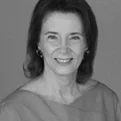Since 1994, Barbara Riegel has led interdisciplinary research in chronic heart failure. Dr. Riegel has tested various disease management approaches and developed psychometrically sound methods of measuring the self-care of persons with heart failure. Her honours include the Claire M. Fagin Award, the Lembright Award from the American Heart Association, the first annual Nursing Research Award of the Heart Failure Society of America, the Distinguished Research Lectureship Award from the American Association of Critical Care Nurses, the Heart Failure Research Prize from the American Heart Association Council on Cardiovascular Nursing and Otsuka America, Inc., and research awards from the Gamma Gamma Chapter, Sigma Theta Tau. She received the San Diego State University Alumni Association Distinguished Alumna Award and the award for Outstanding Faculty Contributions. Dr. Riegel is a Fellow in both the American Academy of Nursing and the American Heart Association.
1. What are your key
areas of interest and research/assignment?
The focus of my research is self-care, the behaviors that individuals use to maintain their health and manage illness. Self-care encompasses treatment adherence, symptom perception, and symptom management. I trained as a Cardiovascular Clinical Nurse Specialist so my emphasis has always been cardiovascular disease in its various forms. I started my work in self-care of chronic heart failure and most of my work remains focused on this population of patients. But in recent years I have expanded my self-care work to address chronic illness in general and multimorbidity. There is a growing recognition that multimorbidity is very common and exceedingly challenging for patients and providers. I work in each of the three areas of self-care with studies of medication adherence and the influence of aging on symptom perception and management.
2. What are the major
challenges in your field?
I think that one of the major challenges in my field is the growing recognition that patients delay seeking care for many reasons, only one of which is denial—the default assumption of many health care providers. I am very interested in the biological changes that occur with aging and how those changes influence the ability to detect and label early symptoms. If early symptoms are blunted with aging—and there is a lot of evidence to suggest this—then I am not surprised that patients would delay seeking care until they are in a crisis state.
3. What is your top management
tip?
Distinguish between management and leadership and identify where you excel. I am a very good leader but I do not care for the everyday management tasks. Knowing where I excel and where I fail has helped me to avoid the ‘Peter Principle’ over the years.
4. What would you single
out as a career highlight?
This is a tough question! I have had so many career highlights but last year I was designated as a Distinguished Scientist by the American Heart Association. That was an incredible honor for me, especially since I was nominated by some of my former students. Another exceptional career highlight was receipt of an endowed chair in gerontology at the University of Pennsylvania, School of Nursing. That was an important recognition of my work.
5. If you had not chosen
this career path you would have become a…?
I would probably have loved being a veterinarian. I love animals and would have loved caring for them.
6. What are your
personal interests outside of work?
I love to cook, to read, and to spend time with my husband. We have taken cooking classes in some of the countries we have visited and locally, of course. A favorite weekend activity is to choose a big cooking project and do it together.
7. Your favourite quote?
From
Gandhi: “You must be the change you wish to see in the world.”



